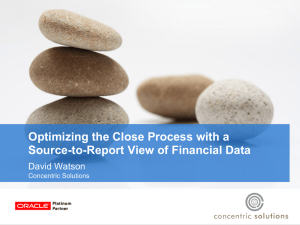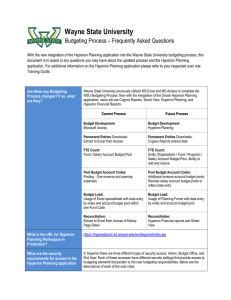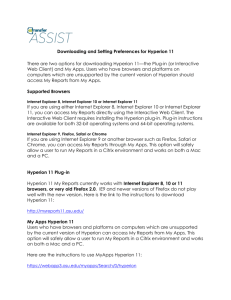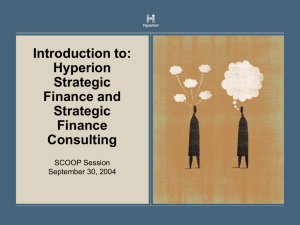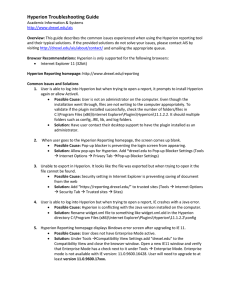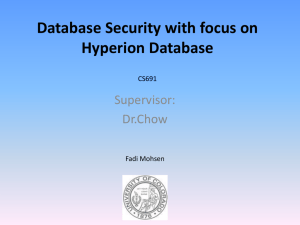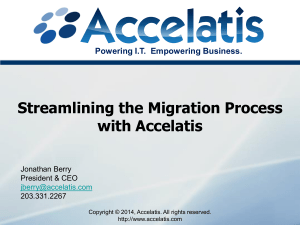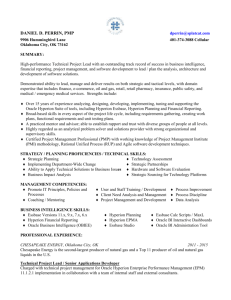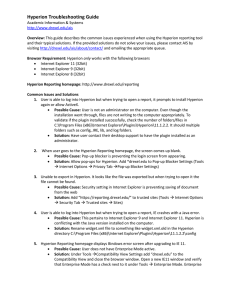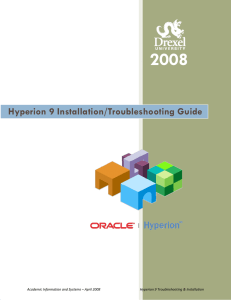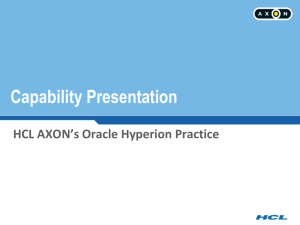Hyperion EPM Overview & Case Study
advertisement
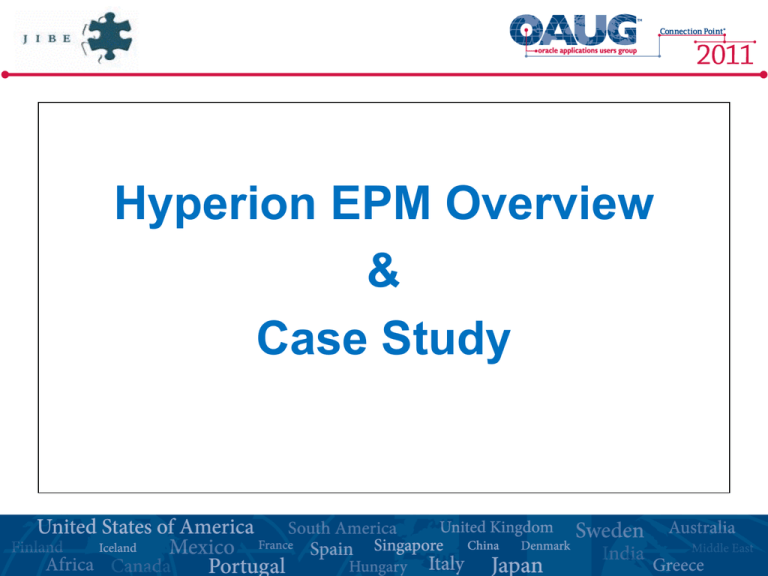
Hyperion EPM Overview & Case Study Agenda • Introduction • EPM Product Overview • Case Study Introduction Use Hyperion? Oracle Integrated BI Planning Acct Close ERP FDQM Oracle Integrated • • • • • ERP - Actual Amounts FDQM – Load / Map Data HFM – Consolidated Actual Amounts HP – Budget / Planning BI Tools Financial Close • Hyperion Financial Management (HFM) – Comprehensive, Web-based application that delivers global financial consolidation, reporting & analysis. • Hyperion Financial Close Mgt – Centralizes mgt of all period-end close activities, replacing checklists with dynamic dashboards that give users ability to immediately view & act on info. • Hyperion Disclosure Mgt – Centralize & effectively manage the development of XBRL tagged submissions Planning • Hyperion Planning – Centralized, Excel & Web-based planning, budgeting and forecasting solution that integrates financial & operational planning processes and improves business predictability. • Hyperion Workforce Planning – Planning module that makes headcount, salary, & compensation planning fast and efficient across the enterprise. • Hyperion Capital Asset Planning – Planning module that automates the planning of capital assets and capital asset related expenses, Case Study • Growing US medical company • Headquarters in Northwest • Multiple sites across country • Annual Budget Process done manually in Excel Challenges • Extremely time consuming – Build and manage model – What if analysis – Report on data • Comparative reporting Actual vs. Budget • Track versions of budget amounts • Minimal controls in place • Security of data – on laptop • Not easy to share with others • Consolidating amounts Solution • Jibe Jumpstart Implementation • Implement Hyperion EPM System – Planning – Central repository database – Integrates actual and budget amounts – Standard calculations – Decentralize Planning – Uses multi-dimensional hierarchies • Use BI Tools – Financial Reports – Well formatted reports – Excel Smart View – Ad hoc analysis Project Phases • Requirements / Design • Build / Unit Test • Test • Deploy / Go Live What is so unique about this project? Implementation • They built most of the application themselves • For a tiny fraction of the time and cost • In less than 3 months How is that possible? Jump Start • • • • • • • • • • Consultant for project involved in sales cycle Hosted Application Customized detailed training session Design session for current and future needs Prioritize requirements & assign to phases Keep only ‘must have’ items in phase 1 Detailed design document Weekly task review sessions Jibe built initial calculations Detailed calculation review Timeline 3/25 4/1 4/12 4/14 4/19 4/30 5/1 May June July 1st - Initial Sales Meeting – Scoping discussion – Customized training – Design session – Jibe installs / hosts Hyperion – Approve detailed design document – Create Planning application shell – Company X builds system – Company X tests system – Go Live – Start annual budget process Phase 1 • Finance owns and maintains system • Budget for: – Revenues – Expenses – Individual employee expenses including existing and new employees – Capital Expenditures • Load current year budget and actual amounts • Comparative Income Statement reporting • Use Department Excel templates Phase 1 (con’t) • Calculations – Aggregations – Clear Data – Project Allocation – Employee Expenses • Deferred Compensation • Shift Differential • Salary Adjustment • Bonus • 401K • Payroll Taxes • Benefits • Temporary Labor Phase 2 - Expand • Phase 2 - < 2 Months • Calculation Training • Add additional calculations – New hire salary – Depreciation – Allocations • Start quarterly forecasting within system • Web Forms • Reports • Calculations • Automate calculations to run nightly Phase 3 • Phase 3 - < 2 Months – Decentralize data entry to ~45 departments • Expand Budgeting and Reporting – Balance Sheet – Cash Flow Benefits • Decentralization – Departments took ownership of their data – Provided better understanding of data – Workflow identified bottlenecks • BI Tools – Less mgt emails asking for data – Less time to develop budget & forecasts – More time & improved analysis tools Key Characteristics • • • • • Small Core Team 1-2 people who makes decisions Availability Committed / Incentive to succeed Standardized stable hierarchies, data entry, calculations and reporting DEMO Workspace Planning Smart View Reporting Web Analysis Ad Hoc Analysis

